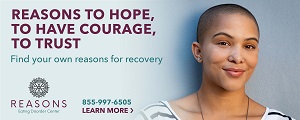- Calls to this hotline are currently being directed to Within Health, Fay or Eating Disorder Solutions
- Representatives are standing by 24/7 to help answer your questions
- All calls are confidential and HIPAA compliant
- There is no obligation or cost to call
- Eating Disorder Hope does not receive any commissions or fees dependent upon which provider you select
- Additional treatment providers are located on our directory or samhsa.gov
How to be Anti Diet: Society, Culture & Body Image

Fiona LaRosa-Waters, Director of Operations & Research at Reasons Eating Disorder Center
With the latest diet trends constantly permeating our newsfeeds, social media, TV, advertising, books, and conversations with acquaintances and loved ones alike, how can we change the conversation so that we think about more than just our bodies or our bodies’ weights?. It’s well past time to ditch diets – as a society and as individuals. So, how can you become an advocate for change? How can you be Anti Diet?
In Part One of a two-part answer to this question, we deconstructed the myths and facts about dieting, reframed nutrition, and explored an intuitive approach to eating as key aspects of an Anti-Diet mindset. Beyond these fundamental components, there is much more to explore. An Anti-Diet mindset also includes sociocultural and body image considerations. Part Two of this series explores those elements.
Deconstructing Dieting
The dieting industry is a 70-billion-dollar industry, but 95% of diets fail and most dieters regain lost weigh within one to five years. Additionally, 35% of dieters progress into habitual dieting, and as many as 25% of habitual dieters progress to developing an eating disorder. Exploring the irony and seriousness of these facts opens the door to many questions. What systematic, sociocultural and economic factors contribute to maintaining such an ineffective – and harmful – industry? I encourage you to approach this topic with a critical thinking mindset in order to unpack the ways in which diet culture upholds a very specific set of “standards.”
Call Reasons Eating Disorder Center for Help 855-997-6505
Weight stigma
Stigma abounds for those with larger bodies. Having experienced this firsthand, I know that stories like my own aren’t hard to come by. Whether in medical settings or social settings, those of us with larger bodies experience many different forms of weight- or size-based discrimination.
At the doctor’s office, weight stigma can show up in unexpected moments. An appointment to address common cold symptoms or a sprained ankle may turn into a conversation about weight. If this happens to you, press for answers. “How,” you might ask, “do these symptoms have any relationship to my weight?” Perhaps more concerning, research shows that people in larger bodies are often not offered the same medical interventions as quickly as their thinner counterparts. Those in larger bodies can advocate for themselves by asking care providers to offer them the same tests and treatment options as those in thinner bodies. Consider posing questions to your provider like, “What advice would you give someone in a thin body? I’d like the same treatment and testing.” If your medical provider refuses to provide you equal consideration, ask that the conversation be noted in your medical chart. Also, consider seeking out providers who support a more modern and progressive understanding of body types.
Beyond the medical environment, weight stigma is rampant in social settings, especially through body talk. How frequently have you questions like, “Have you lost weight?” framed as a compliment? Body talk is still heavily engrained in day-to-day conversation, and body talk insinuates, or blatantly indicates, thinness as a virtue. Challenge yourself and others to deliver non-body compliments. Rather than, “You look so beautiful today,” “You look great,” or “Your diet is paying off,” consider compliments like, “You are full of positive energy today,” “You make me smile,” or “You’re a great listener.” Beyond reducing and de-normalizing body talk in day-to-day life, these types of compliments speak to the heart of what we value in one another and can foster stronger connections. Alternatively, for those who are in eating disorder recovery and feel comfortable disclosing that fact, noting that you are in recovery from an eating disorder can help to quickly remove body talk from the conversation while educating others on the negative impact body conversation can have.
Whether in a medical setting or a social setting, weight stigma can have a significant impact on those of us in larger bodies. Some consider weight stigma one of the last seemingly “acceptable” areas of discrimination, in which it’s fine to make judgments about people’s bodies. It’s not fine. These judgments are extremely harmful. They imply a desire to eliminate larger people from society, and can cultivate feelings of shame, anxiety and depression for those who experience weight bias. Furthermore, those who believe false judgments associated with weight bias can internalize weight stigma, fear gaining weight and be more inclined to harm themselves to avoid weight gain. Weigh bias impacts people of all shapes and sizes.
Health at Every Size (HAES)
The Health at Every Size (HAES) movement is a body-positive, anti-diet movement that upholds key principles associated with wellbeing irrespective of weight. Five key principles comprise the HAES movement:
- Weight Inclusivity: Embrace the diversity of body shapes and sizes in the world and reject the idealization of certain body types or weights.
- Health Enhancement: Advocate for and promote policies that equalize access to health information and care irrespective of size. Prioritize personal practices that support holistic wellbeing – including physical, economic, spiritual, emotional and other needs.
- Eating for Wellbeing: Focus on eating based off of hunger, satiety, nutritional needs and pleasure instead of weight control.
- Respectful Care: Acknowledge weight bias and work to end it. Keep in mind how socioeconomic status, race, gender, sexual orientation, age and other identities impact weight stigma.
- Life-Enhancing Movement: Embrace physical activities that bring you joy.
Exploring the HAES principles and integrating these philosophies into your day-to-day life can greatly support an anti-diet mindset. Share these concepts with others to help educate them on what an anti-diet mindset can look like.
Exploring Feminist Perspectives and Intersectionality
In The Beauty Myth, Naomi Wolf writes, “A culture fixated on female thinness is not an obsession about female beauty, but an obsession about female obedience. Dieting is the most potent political sedative in women’s history; a quietly mad population is a tractable one.” Historically, feminist perspectives on dieting centered on dieting’s impact to white, cisgender, able-bodied women. However, Naomi Wolf’s perspective applies to all people. The harmful consequences of diet culture impact all genders, races and ethnicities, ages, body shapes and sizes, socioeconomic backgrounds and abilities.
We can leverage insights like those from The Beauty Myth and apply them through a lens of intersectionality, too. In the context of dieting and weight stigma, intersectionality involves examining the social determinants of health from a framework that considers all elements of a person’s identity, including but not limited to gender, economics, physical ability, race, ethnicity and culture, as well as the unique presentation that occurs at the overlap and intersection of those identities. Many stereotypes center around body shape, size and weight based on these elements of personal identity. In the context of eating disorder diagnosis and treatment, for example, stereotypes can prevent access to life-saving care. Engrained perceptions of eating disorders as a “thin white woman’s issue” can stand in the way of BIPOC individuals gaining accurate eating disorder diagnoses and treatment.

What you can do
As your knowledge around the social and cultural underpinnings of diet culture grows, you may feel more ready than ever to ditch diet talk, body talk, and weight-based stigma and stereotypes. How can you apply this mindset in day-to-day life, especially when mainstream media flows in the opposite direction?
In her book The Body is Not an Apology: The Power of Radical Self-Love, Sonya Renee Taylor outlines four pillars for radical self-love that can help start you on your journey to creating a new story.
-
Take Out the Toxic
Cleanse your media consumption by removing representation and promotion of diet culture. Fill your feeds with images that embrace health at every size, body positivity, and an intersectional understanding of the human experience. Commit to stripping body talk and body-bashing from your vernacular and encourage others to do the same.
2. Mind Matters
Take a step back to consider the framework through which you view the body. Explore how your previous notions, and the impact of diet culture, have influenced your mindset today. Consider how you intend to shift your mindset, and the tools you’ll leverage to support that shift – whether it be meditation, mantra, art, journaling, therapy or conversation.
3. Unapologetic Action
Take time to explore and discover your body, your terrain. Leverage movement as a way to connect with your physical self. Discover what you appreciate about your body and take time to celebrate those elements.
4. Collective Compassion
Practice compassion and mindfulness with others, and apply it toward yourself, too. Surround yourself with individuals who promote an anti-diet mindset and leverage your community as support when you need help. Give yourself grace throughout your process, understanding that some days it’s easier to embrace a body-positive mindset than on others. That’s okay. Sit with where you are and call upon a community for reinforcement.
Ultimately, an anti-diet mindset isn’t cultivated overnight. Years of diet culture have created significant barriers within our hearts and minds. But, by learning the facts, understanding nutrition, and exploring socioeconomic factors, you can uncover a new mindset as it relates to food and the body. Be part of the change you wish you to see in the world around you, and model a different approach – in body, mind and spirit.
References
- S. String Fearing The Black Body: Origins of Fat Phobia, New York: New York University Press. 2019.
- Taylor, Sonya Renee. The Body Is Not an Apology. 2nd ed., Berrett-Koehler, 2021.
- Wolf, Naomi. The Beauty Myth. Vintage Classics, 2015.
About our Sponsor
Reasons Eating Disorder Center offers a full continuum of care for patients struggling with anorexia, bulimia, binge-eating disorder, and co-occurring issues such as trauma symptoms, substance abuse, bipolar, borderline personality disorder, anxiety, obsessive-compulsive disorder, or depression.
About Fiona LaRosa-Waters
Fiona LaRosa-Waters is an experienced behavioral health marketing professional and community relations specialist, and the Director of Business Development for Reasons Eating Disorder Center. She has been working in the eating disorders field since 2011 and has held positions as a professional outreach representative for eating disorder and substance use facilities, a counselor in a treatment center for adult women with eating disorders and providing outpatient case management and treatment placement services for clients struggling with addictions and eating disorders. Prior to shifting to a career in behavioral health Fiona worked in special education, coordinating the administrative and operational aspects of a residence of deafblind students ages 16-22. She is passionate about helping people locate resources to support treatment and recovery, advancing education about eating disorders and addiction, and connecting with the mental health community. Fiona graduated Summa Cum Laude from Lesley University with a Bachelor of Science in Human Services. She enjoys traveling, public speaking, cooking, and hiking with her dog.
The opinions and views of our guest contributors are shared to provide a broad perspective of eating disorders. These are not necessarily the views of Eating Disorder Hope, but an effort to offer a discussion of various issues by different concerned individuals.
We at Eating Disorder Hope understand that eating disorders result from a combination of environmental and genetic factors. If you or a loved one are suffering from an eating disorder, please know that there is hope for you, and seek immediate professional help.
Reviewed & Approved on June 16, 2021, by Jacquelyn Ekern MS, LPC
Published June 16, 2021 on EatingDisorderHope.com

The EatingDisorderHope.com editorial team comprises experienced writers, editors, and medical reviewers specializing in eating disorders, treatment, and mental and behavioral health.



